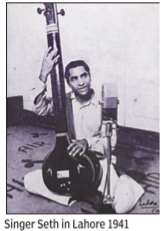Vidya Nath Seth
This is a collection of articles archived for the excellence of their content. |
A profile
The Times of India, Jun 21 2015
Vidya Nath Seth, who influenced Rafi, dead
Avijit Ghosh
Born and bred in Lahore, Seth was the youngest among eight siblings. Interestingly , Seth's passport records his date of birth as June 2, 1915 making him 100 years old.However, his family members insist that was actually born on Feb 29, 1916. Seth began his career as an insurance agent, a vocation he continued even after migrating to Delhi a few weeks before the Partition. In fact, he was among the earliest LIC professionals.
In a radio interview in London in the 1970s, the peerless Mohammed Rafi was asked which singers had influenced him in his early days. Rafi named the maestro K L Saigal, Vidya Nath Seth and Pankaj Mullick in that order. Seth, the lone surviving member of that vintage trio, passed away at his Defence Colony residence on Thursday while sipping his morning tea. He was 99 and perhaps the oldest surviving artiste of the gramophone generation. As many singers of that era, Seth's style had shades of Saigal although he consciously tried to create his own imprint. He sang only five songs in Hindi cinema, all for Roop Rekha, a 1948 film directed by Samar Ghose. Two of them were duets one with actresssinger Munawar Sultana, the other with Surinder Kaur, regarded as the nightingale of Punjab. The music directors were Robi Roy Chowdhury and Pandit Amarnath. Seth himself composed one of the songs, O gori kahe preet kare.
Seth lent his confident voice to a wide-ranging repertoire in non-film songs -geets, ghazals and bhajans. Often, he also set them in tune. He sang in both Hindi and Punjabi and made dozens of records for HMV and Columbia in the 1940s. He was a regular for All India Radio, Lahore and later, AIR, Delhi.
“His non-film songs re cords were quite popular. One of his bhajans, Man phoole phoole phire jagat mein was often heard on Vividh Bharati in the 1950s and 1960s,“ says music historian Pavan Jha.Duniya ka darshan hai mela and Woh hamein tadpa rahe hain are two other hit numbers by him.
“My father was in great demand in radio stations across India -Patna, Kanpur, Jodhpur, Dibrugarh. He also performed on invitation at various princely states such as Kapurthala, Bundi, Hyderabad and Kashmir. And he was among the first who sang on Delhi television in 1954,“ says his London-based elder son Rami, a raconteur by profession. Seth was also a mentor to bhajan singer Purshottamdas Jalota. “Many bhajans sung by his son, Anup Jalota, have their origins in Seth,“ says Jha. Rami also recalls an armed guard coming home in Sitaram Bazaar to escort his father to Red Fort where he sang a number on August 15, 1947 although the family doesn't have any evidence to back that claim.The Rafi interview is available on YouTube.
